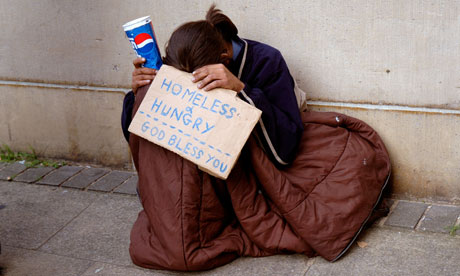Recently I went to my corner shop to buy some milk. I found myself pausing by the celebrity gossip magazines. My first instinct, just in case someone was listening in on my thoughts, was to think: “Ugh, who buys these terrible magazines?” Then I picked one up. There was the cellulite, the weight gained and lost, the bingo wings circled in red. My favourite story was an interview with a pop star, or perhaps a model, who lived in a luxury mansion. I’m the sort of person who usually curdles with envy on hearing about someone’s luxury mansion. But this was different. The story was about how she was lonely. Tragically lonely following a break-up.
I looked about and took the magazine to the till. There was a warm sensation working its way across my chest. I felt lucky. No, that’s not it. I felt smug. This is a confession. I love daytime TV. I smoke, even though I officially gave up years ago. I’m often late, and usually lie about why. And sometimes I feel good when others feel bad.
The Japanese have a saying: “The misfortune of others tastes like honey.” The French speak of joie maligne, a diabolical delight in other people’s suffering. In Danish it is skadefryd; in Hebrew, simcha la-ed; in Mandarin, xìng-zāi-lè-huò; in Russian, zloradstvo; and for the Melanesians who live on the remote Nissan Atoll in Papua New Guinea, it is banbanam. Two millennia ago, the Romans spoke of malevolentia. Earlier still, the Greeks described epichairekakia (literally epi, over, chairo, rejoice, kakia, disgrace). A study in Würzburg in Germany carried out in 2015 found that football fans smiled more quickly and broadly when their rival team missed a penalty, than when their own team scored. “To see others suffer does one good,” wrote the philosopher Friedrich Nietzsche. “This is a hard saying, but a mighty, human, all-too-human principle.”
There has never really been a word for these grubby delights in English. In the 1500s, someone attempted to introduce “epicaricacy” from the ancient Greek, but it didn’t catch on. There could only be one conclusion: as a journalist in the Spectator asserted in 1926, “There is no English word for schadenfreude because there is no such feeling here.” He was wrong, of course.

‘It’s part of many of our cherished communal rituals, from sports to gossip’: model Siobhan at Hired Hands; make-up Grace Ellington; nails Naima Coleman. Photograph: Ilka and Franz for the Observer
I’m British, and enjoying other people’s mishaps and misery feels as much part of my culture as teabags and talking about the weather. “For what do we live but to make sport for our neighbours, and laugh at them in our turn?” proclaims Mr Bennet in that most quintessentially English of novels, Pride and Prejudice. Nothing unites us more strongly in self-righteous joy than an MP caught cooking the books. We’re even not averse to schadenfreude at our own expense: as George Orwell once remarked, the English are unique for celebrating not military triumphs, but disasters (“Into the valley of death rode the 600...”).
We know how to enjoy failures. But ask us to name this enjoyment, and our language falls into a hypocritical silence. It averts its gaze and squirms. And so we adopted the German word. From schaden, meaning damage or harm, and freude, meaning joy or pleasure: damage-joy.
No one likes to think about their flaws, but in them so much of what makes us human is revealed. Enjoying other people’s misfortunes might sound simple – a mere glint of malice, a flick of spite. But look closer and you’ll glimpse some of the most hidden yet important parts of our lives.
When I pay attention to the pleasures I might feel in others’ disasters, I am struck by the variety of tastes and textures involved. There is the glee at incompetence – not just of skiers faceplanting in the snow, but at screw-ups of implausible magnitude: when Nasa lost a $125m Mars orbiter because half the team were using imperial measurements and the other, metric. Then there is the self-righteous satisfaction I get when hypocrites are exposed: a politician accidentally tweets a picture of his erection (he meant to send it directly to his intern). And of course, there is the inner triumph of seeing a rival falter. The other day, in the coffee shop, a colleague asked if I’d got the promotion I’d gone for. No, I said. And I noticed, at the corner of his mouth, the barely perceptible twitch of a grin before the tumble of commiserations. Oh bad luck. Ah, their loss, the idiots. And I was tempted to ask: “Did you just smile?” But I didn’t. Because when he loses out – as he sometimes does – I know I experience a happy twinge, too.
Sometimes it is easy to share our delight, reposting memes of a disgraced politician’s resignation speech. Far harder to acknowledge are those spasms of relief which accompany the bad news of our successful friends and relatives. They come involuntarily, these confusing bursts of pleasure, swirled through with shame. And they worry us – not just because we fear that our lack of compassion says something terrible about us – because they point so clearly to our envy and inferiority, and how we clutch at the disappointments of others in order to feel better about our own.
When my brother took his kids on a fabulous summer holiday to America, I felt bad because I never take my kids anywhere since it’s too much effort and too expensive. And then I saw his Facebook status: it rained.

Whoops! Careful you don’t slip up. Photograph: Ilka & Franz for the Observer
Today schadenfreude is all around us. It’s there in the way we do politics, how we treat celebrities, in online fail videos. But these heady pleasures are shot through with unease. Moralists have long despised schadenfreude. The philosopher Arthur Schopenhauer called it “an infallible sign of a thoroughly bad heart and profound moral worthlessness”, the worst trait in human nature. (He also said that anyone caught enjoying the suffering of others should be shunned from human society. Which made me sweat a bit.)
I have come to believe that Schopenhauer was wrong. When the word schadenfreude first appeared in English writing in 1853, it caused great excitement. This was probably not the intention of RC Trench, the archbishop of Dublin, who first mentioned it in On the Study of Words. For Trench, the mere existence of the word was unholy and fearful, a “mournful record of the strange wickednesses which the genius of man has invented”.
His fellow Victorians adopted the word for a range of pleasures, from hilarity to self-righteous vindication, from triumph to relief. In the 1890s, animal-rights campaigner Frances Power Cobbe wrote a manifesto entitled Schadenfreude, identifying the emotion with the bloodlust of boys torturing stray cats for fun.
We still associate many different pleasures with this word, unclear perhaps exactly what it means in the original, or where its perimeters lie. But looking at how the word has been used in English it is possible to identify repeated themes. Schadenfreude is usually thought of as a spectator sport – opportunistically enjoying someone’s misfortune rather than gloating at pain you’ve caused yourself. We usually think of it as a furtive emotion, and no wonder. We might be worried not just about looking malicious, but that our schadenfreude exposes our other flaws, too – our pettiness, our envy, our feelings of inadequacy.
Another feature of schadenfreude is that we often feel entitled to it when the suffering can be construed as a comeuppance – a deserved punishment for being smug or hypocritical, or breaking the law. So we relish our moral superiority (usually only at a safe distance). In 2015, US pastor Tony Perkins said that floods were sent by God to punish abortion and gay marriage. And then his own house flooded and he had to escape in a canoe. Even the ever-impartial BBC enjoyed this story, posing aerial pictures of the flooded house next to his controversial “God is trying to send us a message” interview.
Schadenfreude is usually thought of as glee at discomforts and gaffes rather than at tragedies and deaths. But this rule isn’t hard and fast, and context matters. We are willing to see celebrities, or people from the remote past, endure horrors that would dismay us if they were happening now or to our friends. All emotions are what psychologists call “cognitive” – in other words, not simply reflex reactions to external triggers, but complex processes requiring us to appraise and judge our relationship with the world around us and tailor our responses accordingly.
Sometimes we judge wrongly, and our schadenfreude leaves us feeling morally awkward. There is an episode of The Simpsons in which Homer’s infuriatingly perfect neighbour Ned Flanders opens a shop, The Leftorium. Given the chance to imagine three wishes, Homer fantasises that Ned’s business collapses. First, he sees the shop empty of customers, then Flanders turning out his pockets, then Flanders begging the bailiffs. It is only when Homer imagines Flanders’s grave, Flanders’s children weeping beside it, that he stops himself. “Too far,” he says, and quickly rewinds to the image of the bankrupt shop.
These questions about how and why we enjoy the pain of others – what is acceptable, what is “too far” – have featured in some of the greatest works of philosophy and literature for over 2,000 years. But arguably the urgency to understand schadenfreude has never been so great as today.
In December 2008, a reader of the New York Times lamented that we are living in a “golden age of schadenfreude”. Similar phrases have appeared since on blogs and in op-eds. Truthfully, we can’t ever know whether we are actually experiencing more schadenfreude than before. It certainly seems a more obvious feature of our collective lives, since what used to be hidden or else communicated in fleeting sniggers by the water cooler is now preserved forever in “likes” and “shares” in the digital aspic.
There has been an explosion of research. Before 2000, barely any academic articles were published with the word “schadenfreude” in the title. Now even a cursory search throws up hundreds, from neuroscience to philosophy to management studies. What is driving all this interest? No doubt it is partly motivated by our attempts to understand life in the internet age, where sniggering at other people, once often socially inappropriate, now comes with less risk. Just as important, in my view, is our growing commitment to empathy. The capacity to attune ourselves to other people’s suffering is highly prized today – and rightly so. Putting ourselves in another’s shoes impacts on our ability to lead others, to parent, to be a decent partner and friend. And the more important empathy becomes, the more obnoxious schadenfreude seems.
It is not just Victorian moralists who recoil from it. Today’s humanists find it awkward, too. Schadenfreude has been called “empathy’s shadow”, casting the two as fundamentally incompatible. Psychologist Simon Baron-Cohen has pointed out that psychopaths are not only detached from other people’s suffering but even enjoy it: “The Germans have a word for this,” writes Baron-Cohen. With all this swirling around, it’s little wonder that even when schadenfreude feels right, it also feels very wrong.
Yet schadenfreude has its benefits – a quick win which alleviates inferiority or envy; a way of bonding over the failure of a smug colleague. But it is also a testament to our capacity for emotional flexibility, our ability to hold apparently contradictory thoughts and feelings in mind simultaneously. Dostoyevsky knew that schadenfreude and sympathy are not either/or responses, but can be felt all at once. When, in Crime and Punishment, Marmeladov is brought, bloodied and unconscious, into the St Petersburg tenement where he lives following an accident, all the residents crowd round. They experience, wrote Dostoyevsky, “that strange sense of inner satisfaction that always manifests itself, even among the victim’s nearest and dearest, when someone is afflicted by a sudden catastrophe; a sensation that not a single one of us is proof against, however sincere our feelings of pity and sympathy”.
We may well be living in an age of schadenfreude, and fear that this emotion is leading us astray. But as with all emotions, condemning it only gets you so far. What we really need is to think afresh about the work this much-maligned emotion does for us, and what it tells us about our relationships with ourselves and each other.
Schadenfreude may appear antisocial. Yet it is a feature of many of our most cherished communal rituals, from sports to gossip. It may seem misanthropic, yet it is enmeshed in so much of what is distinctly human about how we live: the instinct for justice and fairness; a need for hierarchies and the quest for status within them; the desire to belong to and protect the groups that keep us safe. It may seem superior and demeaning, yet it also speaks of our need to appreciate the absurdity of our attempts to appear in control in a world forever slipping out of our grasp. It might seem isolating and divisive, but it testifies to our need to not feel alone in our disappointments, but to seek the consolations of being part of a community of the failed.
Schadenfreude, exquisite and utterly shabby, is a flaw. But it is a flaw we must all face up to if we truly want to understand life in the modern world.


